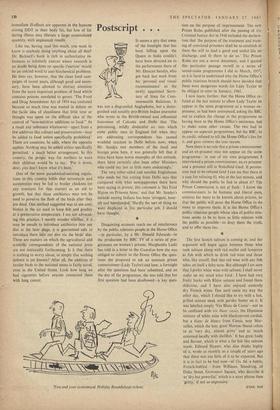Postscript . . .
The very sober-sided and sensible Englishman who sends me this cutting from Delhi says that compared with what newspapermen there have been saying in private, this comment is 'like Enid Blyton on Princess Anne,' and that Mr. Sandys's attitude among Indians has been 'arrogant, boor- ish and boneheaded.' Hardly the sort of thing we want displayed in this particular job, I should have thought.
Disquieting accounts reach me of interference by the public relations people at the Home Office —in particular, by a Mr. Donald Edwards—in the production by BBC TV of a series of pro- grammes on women's prisons. Marghanita Laski has told in a letter to the Guardian how she was obliged to submit to the Home Office the ques- tions she proposed to ask an assistant prison commissioner (Lady Taylor) and how, a fortnight after the questions had been submitted, and on the day of the programme, she was told that her first question had been disallowed—a key ques- Lion on the purpose of imprisonment. The new Prison Rules published after the passing of the Criminal Justice Act in 1948 included the declara- tion that 'the purpose of the treatment and train- ing of convicted prisoners shall be to establish in them the will to lead a good and useful life on discharge, and fit them to do so.' The Prison Rules are not a secret document, and I quoted this particular passage myself in a series of sound-radio programmes I did in March, 1957, so it is hard to understand why the Home Office's public relations branch should have decided that these were dangerous words for Lady Taylor to be obliged to utter in January, 1961.
I now learn, further, that the Home Office re- fused at the last minute to allow Lady Taylor to appear in the same programme as a woman ex- prisoner, as had been announced, asking the BBC not to explain the change in the programme as having been at the Home Office's insistence, but to make some other excuse. The two had to appear on separate programmes, but the BBC, to its credit, refused to tell the Home Office's lies for it. and gave viewers the true reason.
Now there is no rule that a prison commissioner and an ex-prisoner may not appear on the same programme : in one of my own programmes I interviewed a prison commissioner, an ex-prisoner and a prisoner still in Wakefield Gaol. If permis- sion had to be refused (and I can see that there is a case for refusing it), why at the last minute, and why should the public be lied to about it? The Prison Commission is not at fault: I know the commissioners to be humane and liberal men, anxious for more to be known about prisons, so that the public will press the Home Office to do more to improve them. It is the Home Office's public relations people whose idea of public rela- tions seems to be to have as little relation with the public as possible—to deny them the truth, and to offer them lies.
The first Scotch salmon is coming in, and the argument will begin again between those who rank salmon along with red mullet and lampreys as fish with which to drink red wine and those who, like myself, find that red wine with any fish takes on itself a fishy taste. But although I am sure that I prefer white wine with salmon, I shall never make up my mind what kind: I have had very fruity hocks with Rhine salmon and found them delicious, and I have also enjoyed austerely dry French wines. One such came my way the other day, which I should like to try with a hot, grilled salmon steak with parsley butter on it. It was labelled simply `Vin Blanc de Cassis'—not to be confused with yin blanc cassis, the Dijonnais mixture of white wine with blackcurrant cordial, but a blanc de blows from Cassis, near Mar- seilles, which the late, great Morton Shand refers to as 'very dry, almost gritty' and as 'much esteemed locally with shellfish.' It has great body and flavour, which is what a fat fish like salmon needs. Edward Hyams, who also thinks highly of it, wrote as recently as a couple of years ago that there was too little of it to be exported. But it is in fact to be had now—at 11s. 6d. a bottle, French-bottled — from Williams, Standring, of Duke Street, Grosvenor Square, who describe it as 'dry but powerful,' which is a nicer phrase than 'gritty,' if not so expressive.
CYRIL RAY










































 Previous page
Previous page